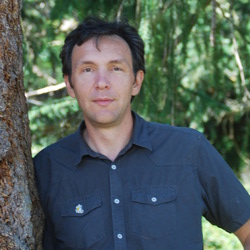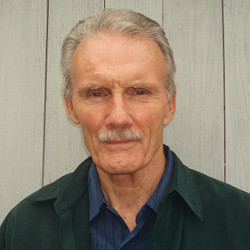A2A: Scott Elliott & Lamar Herrin
The novels Fractures and Temple Grove are set at opposite ends of the United States, and their environmentalist concerns are different: the one with hydrofracking in Pennsylvania, the other with logging in the Pacific Northwest. But their authors, Lamar Herrin and Scott Elliott, found plenty of common ground during a recent e-mail exchange… not least of all in their ability to draw out the characters and the relationships that make these more than just “a book about hydrofracking” or “a book about the logging controversy.” In a way, those may be the least of what these two novels are “about.”
 Scott Elliott: Fractures is masterful in its ability to take us into interior lives. It’s been some time since I’ve read a novel so invested in multiple characters and the tenuous connections between them, and so ambitious and successful at seamlessly moving us into and out of different characters’ heads. Plumbing the depths of characters’ psyches and putting pressure on them would seem to have a ready analogue in the central subject matter and source of conflict that the book takes up in all of its complexity—the hydrofracking in which deep drilling and the pressure of lots of water laced with chemicals releases natural gas.
Scott Elliott: Fractures is masterful in its ability to take us into interior lives. It’s been some time since I’ve read a novel so invested in multiple characters and the tenuous connections between them, and so ambitious and successful at seamlessly moving us into and out of different characters’ heads. Plumbing the depths of characters’ psyches and putting pressure on them would seem to have a ready analogue in the central subject matter and source of conflict that the book takes up in all of its complexity—the hydrofracking in which deep drilling and the pressure of lots of water laced with chemicals releases natural gas.
I wonder if you could talk about your research into natural gas drilling and also the degree to which you thought about the notion of hydrofracking in a metaphorical sense when you were writing the novel and within the novel—as an analogue for the process of fiction writing, and for the way pressure tests bonds between characters in the novel’s extended family.

Lamar Herrin: My research into natural gas drilling took place mostly on the ground, wandering around drilling sites in northern Pennsylvania and making a bit of a nuisance of myself. Talking to anybody who would talk back and keeping my senses alert. I never managed to get onto a drilling rig floor, at least not in person. But as I began to do parallel wandering on the web, and as one video led me to four or five others, I did manage to accumulate a lot of impressions. It turns out drill workers like to video themselves working, sound effects and all. It didn’t take a great leap of the imagination to smell the smells. I talked to certain people at Cornell University and did the reading I could, but mostly it was groundwork and moving around on the web.
And I talked to people in the towns. Friends have asked me what got me thinking of a novel, and I’ve come to believe it was the moment I walked into the Susquehanna County Court House in Montrose, Pennsylvania (I had gone there, and to Dimock, which is close by, to simply get enlightened, to see what might be coming our way in the Southern Tier of New York State). But in the court house a policeman on duty explained that the desks I saw lined up and down the long central hall had been set out so that property owners could come check their deeds, and so that competing family members (or so the policeman claimed) could see who owned what. Almost all of my novels have had to do with families, and here, I quickly realized, was a plot.
8 December 2013 | author2author |
A2A: Marek Waldorf & Thomas McGonigle
With his debut novel, The Short Fall, recently out, Marek Waldorf engaged in a series of email exchanges with the author Thomas McGonigle. The book that they’re talking about here, St. Patrick’s Day, Dublin 1974, isn’t actually out yet, although fragments have been appearing in literary magazines over the years—and, apparently, Dalkey Archive Press does plan to publish it; it’s merely a question of when. In the meantime, I’m delighted they’ve agreed to share their conversation as an Author2Author post.
 Marek Waldorf: I wanted to open with a quote from St. Patrick’s Day, Dublin 1974. Just a sentence because your sentences are wonders to behold, either at a swoop or counting the surprises:
Marek Waldorf: I wanted to open with a quote from St. Patrick’s Day, Dublin 1974. Just a sentence because your sentences are wonders to behold, either at a swoop or counting the surprises:
“That woman, the Wife of the Poet, would follow a coffin hoping it would spring a leak and she could lie under it with mouth open ready to sup on the fluids to nourish her through the rest of her miserable life of hanging out, having waited for him to finish up the drink for the night so she could get him home so he could vomit in the privacy of her scorn for him.”
Compared to the new book, both Petkov and Patchogue seem closer in form to collage. Patchogue tracks a reinsertion—a going-to and a coming-away—but it’s also coming at the reader from every direction: I was constantly looking over my shoulder, paging back for the dangling/missing threads (somebody always seems to be sneaking up on you). Because Dublin has a supreme “through-line” for St. Patrick’s Day, 1974, I found it easier to catch the other lines of reminiscence either refracting out from it or (more likely) in one of those hall-of mirror glimpses. In other words, the new book negotiates the layers of memory and loss with greater ease, or maybe more luxuriantly. So there’s my overarching question: How does the mood of this book, its projection of memory, “dictate” the style? Do you see a kind of mellowing in both subject matter & form here, or would you reject that term? And in the two earlier—jumpier—novels, how do you think about what goes where? Do you imagine the reader moving sequentially through these works, playing hopscotch, or making the time to do both?
3 November 2013 | author2author |

 Our Endless and Proper Work is my new book with Belt Publishing about starting (and sticking to) a productive writing practice.
Our Endless and Proper Work is my new book with Belt Publishing about starting (and sticking to) a productive writing practice. 
